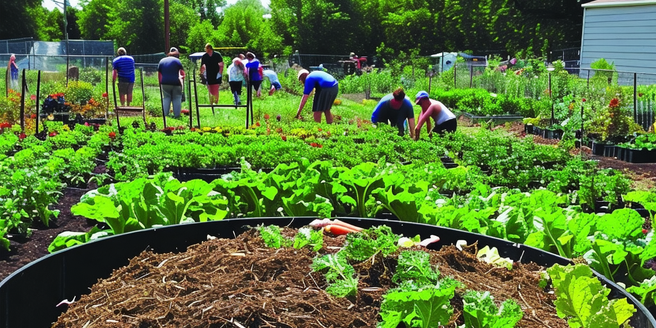
Understanding the Importance of Waste Reduction
Waste reduction is a crucial step towards achieving sustainable development. By minimizing waste, we conserve resources, reduce greenhouse gas emissions, and diminish pollution, leading to healthier ecosystems and communities. Effective waste reduction starts at the individual level, where habits such as reusing, recycling, and mindful purchasing can make a significant impact. Education and awareness around the importance of waste reduction can drive collective efforts, encouraging both individuals and businesses to adopt more sustainable practices. Governments also play a crucial role in implementing policies that facilitate waste reduction, such as waste segregation laws, incentives for using eco-friendly products, and penalties for excessive waste generation. In the long run, these measures not only protect the environment but also foster economic growth by creating jobs in recycling and waste management industries.
Composting: Turning Waste into Resource
Composting is a natural process of recycling organic waste into valuable fertilizer, providing a simple yet effective solution for reducing waste. It involves the breakdown of organic materials, such as kitchen scraps and yard waste, into a nutrient-rich soil amendment that can enhance plant growth. By composting, individuals and communities can significantly decrease the amount of waste sent to landfills, thus reducing methane emissions and conserving valuable landfill space. Furthermore, composting enriches the soil, retains moisture, and suppresses plant diseases, making it an excellent practice for gardeners and farmers. Implementing composting systems at home or in community settings fosters environmental stewardship and encourages sustainable living. By turning waste into a resource, composting not only alleviates waste management challenges but also contributes to a circular economy.
Recycling Best Practices
Recycling transforms used materials into new products, conserving resources and energy. To maximize its benefits, it’s essential to follow best practices. Start by understanding your local recycling guidelines; different municipalities have specific rules about what can and cannot be recycled. Always rinse containers to avoid contamination and sort items correctly into designated bins. Avoid recycling unapproved materials, such as plastic bags or polystyrene, as they can disrupt the recycling process. Educate yourself on symbols and labels to ensure proper disposal. Encouraging friends, family, and colleagues to recycle responsibly amplifies the effort. Additionally, supporting companies that prioritize sustainable packaging choices closes the loop in the recycling process. By adhering to these best practices, individuals can play a pivotal role in reducing waste, conserving resources, and promoting a healthier planet.
The Benefits of a Zero-Waste Lifestyle
Adopting a zero-waste lifestyle has numerous advantages for both individuals and the environment. It encourages people to minimize consumption, prioritize reusable items, and reduce their overall waste footprint. This lifestyle fosters creative problem-solving by finding innovative ways to repurpose and reuse materials. Financially, it can lead to savings as individuals become more conscientious about their purchases, focusing on quality over quantity. Environmentally, it reduces the strain on landfills and decreases greenhouse gas emissions. Additionally, it supports a shift towards sustainable economic models, promoting the development and consumption of products with reduced environmental impact. A zero-waste lifestyle also inspires community engagement, as collective efforts contribute to broader societal change. By embracing zero waste, individuals can live more sustainably, reduce their ecological footprint, and contribute to a healthier planet.
Green Technologies for Waste Management
Green technologies revolutionize waste management by increasing efficiency and minimizing environmental impact. Innovations such as waste-to-energy technologies convert non-recyclable waste into heat, electricity, or fuel, offering a renewable energy source while reducing landfill dependency. Advanced recycling techniques, including automated sorting systems, enhance material recovery rates and processing efficiency. Biological treatment methods, like anaerobic digestion, break down organic waste to produce biogas and nutrient-rich digestate. Additionally, digital tools and data analytics optimize waste collection routes, reducing fuel consumption and associated emissions. By supporting the development and implementation of green technologies, both public and private sectors can significantly improve waste management systems. These advancements not only promote environmental sustainability but also create economic opportunities in the burgeoning green technology industry, driving progress towards a circular economy.
Community Initiatives to Reduce Waste
Community-led initiatives are vital for successful waste reduction, fostering collaboration and engagement. Educational programs raise awareness about waste issues and teach practical reduction methods such as recycling and composting. Community swap events and repair cafes promote the reuse and repair of items, diverting waste from landfills. Local businesses can implement take-back schemes for product recycling, while community gardens utilize composted waste to enhance soil health. Engaging volunteers in clean-up drives not only reduces waste but also strengthens community ties. By supporting local waste reduction policies, communities can lobby for better infrastructure, such as recycling facilities or composting programs. These initiatives empower residents, create a culture of sustainability, and contribute to tangible environmental benefits. Through collective action, communities play a critical role in driving waste reduction and fostering a sustainable future.
